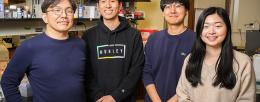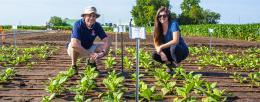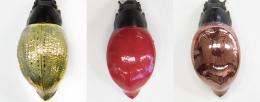News Archive
IGB Profile - Tina Barbasch
Shelby Lawson
Decoding decisions of parental stickleback fish
Growing up in upstate New York, Tina Barbasch spent countless hours catching salamanders and frogs in her backyard woods…
Nerves prompt muscle to release factors that boost brain health
Liz Ahlberg Touchstone
Exercise prompts muscles to release molecular cargo that boosts brain cell function and connection, but the process is not well understood. New research from the…
Understanding the language of proteins
Stuart Robbins
Architecturally, Large Language Models are the basis for Generative AI popularized by ChatGPT from OpenAI, and similar products from Meta, Google, Microsoft, and C3.AI. …
Engineered increase in mesophyll conductance improves photosynthetic efficiency in field trial
RIPE Communications
It is possible to engineer increased mesophyll conductance in plants according to new research from the University of Illinois Urbana-Champaign. Mesophyll conductance plays a…
IGB faculty elected to American Academy of Arts and Sciences
Liz Ahlberg Touchstone
Five University of Illinois Urbana-Champaign faculty members, including three from the IGB, have been elected members of the American Academy of Arts and…
New photonic crystal approach can enable sensitive and affordable detection of biomarkers
Shelby Lawson
Biomarkers are small molecules of interest to researchers, because they can indicate underlying diseases, often even before symptoms even appear. However, detecting these…
Tibetan plateau had broader social dimensions than previously thought
Ananya Sen
The Tibetan plateau—the world’s highest and largest plateau—poses a challenge to the people who live there because of its extreme climate. In a new study, researchers have…
IGB employees honored with Chancellor's Staff Excellence Award
Maeve Reilly
Sixteen academic professionals and civil service staff members, including two from the IGB, have received the Chancellor’s Staff Excellence Award recognizing exceptional…
Beetle morphology influences fog droplet collection, researchers find
Shelby Lawson
In coastal arid regions where water sources are scarce, windborne fog droplets play a crucial role in sustaining life. Many plants collect droplets from the fog, serving as a…








